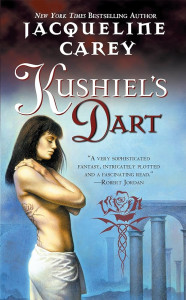 Rebecca Swain wrote this review.
Rebecca Swain wrote this review.
Take a deep breath before you start this book. It’s a heavy 701 pages of adventure and sex. It’s also one of the most entertaining books I’ve read in a long time. I recommend it highly.
Phèdre is a young girl who lives in the country of Terre d’Ange, where all the men are good-looking, all the women are good-looking, and all the children are … you know. Terre d’Ange was created by the angel Elua, hence its name. Jacqueline Carey gives us some details about Elua’s religion, about Terre d’Ange, and indeed about the world at large, which is an alternate version of Earth. Most of the countries and important figures outside Carey’s created land have familiar names: Alba for England, Eire for Ireland, Yeshua ben Yusef for Jesus, etc.
Phedre spends perhaps six years of her childhood as a ward of Cereus House, a house of pleasure in the Night Court, an area of the city made up of thirteen brothels named for night-blooming flowers. When she is 10 her guardians find out that she has some very unusual proclivities, and sell her to Delaunay, a poet who is not allowed to publish his poetry any more but still has mysterious connections at the king’s court. Delaunay raises Phèdre and Alcuin, a boy he has guardianship of, to be courtesans and spies. When they are 15 Delaunay begins selling their services to carefully selected clients from whom he wishes information. Phèdre loves the work – the sex and the spying.
Delaunay has made a promise to a dead prince, and keeping that promise involves him in court intrigue. Various factions are vying for the throne, and possibly there are D’Angeline traitors making deals with barbarians to invade the country. Delaunay uses Alcuin and Phèdre to ferret out information from unsuspecting clients. But Delaunay’s quest for knowledge has terrible consequences, and Phèdre is launched on a series of adventures that test her courage and all of her special talents. Accompanied by the handsome Joscelin, her bodyguard, she travels to places she never thought she’d see, and plies her trades – sometimes willingly, sometimes not – among people she never dreamed she’d meet. Her primary goals are to stay alive and to save her country.
This novel is full of adventure and political intrigue, but some sections move rather slowly, as you might expect in a work of this length. In addition, Carey wields a heavy hand when it comes to foreshadowing. Many events that would make exciting surprises are spoiled because Cary has telegraphed pages ahead of time that something tragic or amazing is going to happen.
Furthermore, Carey’s Earth doesn’t work very well for me. Because she goes to so much trouble to create her imaginary country and its customs, religion, and politics, her use of a slightly altered real world setting for this country strikes me as lazy and unimaginative. Why not create a whole imaginary world? Or set her story in a real country and tweak history? I found this irritating, but it didn’t spoil the book for me.
However, overriding any complaints I have about the book is the fact that Phèdre is a wonderful female character: brave, warmhearted, smart, and lusty. She’s a courtesan who actually likes having sex and uses her beauty to her advantage without becoming cold or unloving. She is a refreshing change as a heroine. Her character gives the story a freshness and excitement lacking in so many fantasy novels. (I also became quite enamored of her companion Joscelin, speaking of lust.)
Kushiel’s Dart is a damn good story, full of adventure and courage. It’s well worth reading all 701 pages.
Parents, you may want to look through this book before you let your teen read it. It contains explicit sex, and some people may find the nature of it disturbing.
(Tor, 2001)
